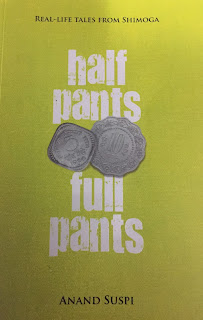On
India
is a collection of writings by Khuswant Singh. It is edited by his
daughter Mala Dayal. According to the editor though Khuswant Singh
had said that he was not proud to be an Indian, his heart was clearly
in India, specially in Delhi, which he gave seven reasons for loving.
These seven reasons
are featured in this collection. He has also written about the other
three metros. His description of Mumbai made me throw up. He
describes it as a filthy city and with almost no greenery. Yes, Delhi
is greener but when it comes to squalor it is at par with Mumbai.
Speaking of the change of name to Mumbai, he says no educated Indian
calls it anything other than Bombay. Now this is a partisan view not
supported by any research. I hail from a highly educated
Maharashtrian family and all my relatives have always called it
Mumbai. Not because of regional pride, but because it was simply
Mumbai for them.
His
write up about Madras is delightful, but his writing about Calcutta
is cryptic. It shows his utter lack of interest in the city of joy.
He is silent on change of name of these two cities for reasons best
known to him.
His
renditions of Guru Nanak’s Barah Mah are simply a delight. He
takes digs at the VIP culture and the celebrity preachers who have
cropped up in every religion.
Wounds
of partition are evident in Khuswant Singh’s writings. He narrates
in a poignant manner how Christians and Parsis painted their outer
walls declaring their religion and Hindus and Sikhs were uprooted
from their own homes. He speaks of Royalties who had a European as a
junior wife. But she did not hail from any royal family. She was
either a nurse, stenographer or a bar dancer. He writes how difficult
it was for them to adjust to their newly exalted status.
His
Sikh pride and allegiance towards the congress party is evident from
his writings. He says ‘We have lost in Gujarat, we may lose in
some other states and the fundoos may rule us while paying lip
service to secularism – or not even that. But I still hope that
revulsion against them will build up and they will eventually be
thrown into the garbage can of history, where they belong. It is the
duty of every sane Indian to put them there.
He
writes about Hindu God men and yoga masters and writes about their
internal rivalry.
He
steps into the territory which caused lot of trouble to the
celebrated author Perumal Murugan. He says : ‘Some Hindu
communities preserve strange customs. The men among the Bishnois, a
small group inhabiting a desert track west of Delhi, choose the
fittest young man in the community and make him Gama Shah ka Sand –
the stud bull of Gama Shah – their legendary hero. The stud bull’s
main function is to impregnate wives of impotent or sterile Bishnois.
When the men are at work in the fields, the stud visits the homes of
the needy. His ornate pair of slippers left conspicuously on the
threshold indicates that the housewife is busy.’
In
spite of all the eccentricities and flaws this book is highly
readable. The old Sardar never disappoints.









